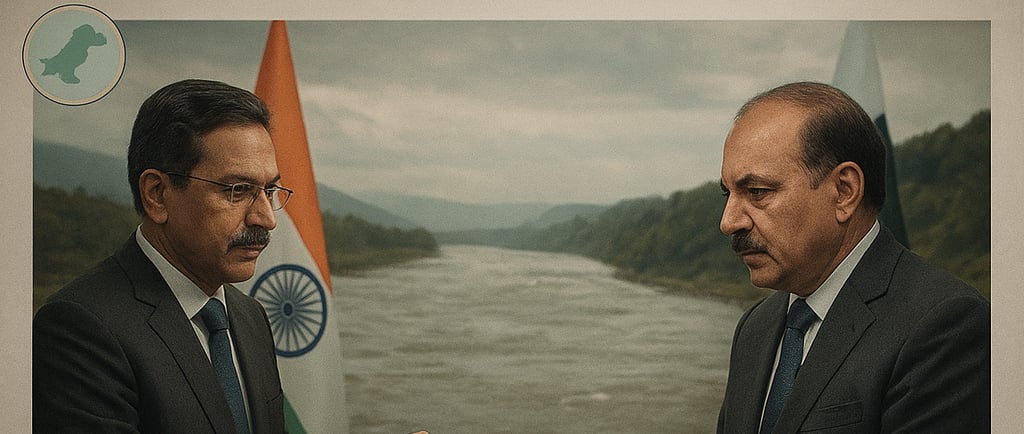After Months of Silence, India Warns Pakistan of Flood Risk | Indus Waters Treaty Revives Contact
India issues a flood warning to Pakistan through the Indus Waters Treaty, marking the first official contact since the May 2025 clash. Learn how this rare move impacts water-sharing, regional tensions, and Pakistan’s agriculture.
INTERNATIONALNATIONAL
8/25/20252 min read


India Alerts Pakistan of Flood Risk Through Indus Waters Treaty After Months of Silence
ISLAMABAD: In a rare move following months of strained ties, India has shared critical flood-related data with Pakistan under the framework of the Indus Waters Treaty (IWT). Officials confirmed on Monday that New Delhi issued a warning about potential flooding in the Tawi River in Jammu, marking the first such communication since the May military confrontation between the two nuclear-armed neighbors.
According to diplomatic sources, the Indian High Commission in Islamabad passed on the alert on Sunday, August 24. Pakistani authorities immediately acted on the information and issued public warnings to prevent damage and loss of life.
First Contact Since May Conflict
This exchange of information represents the first significant contact between India and Pakistan since their armed clash in May 2025. That conflict erupted after India accused Islamabad of involvement in a militant attack in Pahalgam, IIOJK, which left 26 people dead. Pakistan strongly rejected the allegation, but New Delhi suspended cooperation under the Indus Waters Treaty in its aftermath.
The standoff escalated into one of the most intense military engagements in decades before a US-brokered ceasefire restored a fragile calm.
Indus Waters Treaty Explained
The Indus Waters Treaty, signed in 1960 with World Bank mediation, governs water distribution between the two countries.
India controls the eastern rivers: Ravi, Beas, and Sutlej.
Pakistan has rights over the western rivers: Indus, Jhelum, and Chenab.
The treaty includes a dispute-resolution mechanism but does not allow unilateral suspension or termination. Despite three wars and repeated tensions, the pact has endured for more than six decades.
Water Disputes and Rising Concerns
For years, Pakistan has accused India of unfairly diverting water by building dams and barrages upstream, threatening irrigation and hydropower needs. Nearly 80% of Pakistan’s agriculture depends on the Indus Basin system.
Islamabad argues that projects like Kishanganga and Ratle violate treaty terms, while India insists they fall within legal limits. Pakistan has repeatedly sought international arbitration, while India claims Islamabad deliberately prolongs the complaints process.
If the treaty remains suspended, India could withhold vital flood data and seasonal water release information, creating uncertainty for Pakistan’s farming sector.
Pakistan’s Reaction
Pakistani experts and farmers warn that the suspension of the treaty would have serious consequences for agriculture and food security.
“If water flows are disrupted, crops like wheat, rice, and sugarcane will be hit hard. Farmers already struggling with thin profit margins will suffer the most,” said Ghasharib Shaokat of Pakistan Agriculture Research.
Khalid Hussain Baath, head of a national farmers’ union, called India’s stance an act of aggression: “We are already facing low rainfall and reduced snowmelt. A cut in river flows could devastate our agricultural output.”
Hague Court Ruling in Pakistan’s Favour
In June 2025, the Permanent Court of Arbitration (PCA) in The Hague issued a supplemental award in Pakistan’s favor. The court ruled that India cannot unilaterally suspend the Indus Waters Treaty or undermine its dispute-resolution mechanisms.
The Foreign Office (FO) welcomed the ruling, urging India to return to normal treaty operations and honor its international obligations.
“The Court of Arbitration has reaffirmed its jurisdiction and made clear that India’s unilateral suspension cannot obstruct ongoing proceedings,” the FO said in a statement.
Conclusion
The latest Indian warning to Pakistan under the Indus Waters Treaty signals a cautious reopening of communication channels between the two rivals. While the flood alert shows that the treaty’s mechanisms remain functional, long-term uncertainties persist.
With agriculture, food security, and regional stability tied directly to water flows, experts stress that both nations must prioritize dialogue and protect the treaty, which has remained a rare example of cooperation despite decades of conflict.
Explore
Your lens into Pakistan's vibrant stories.
Connect
Discover
+92-300-0440097
© 2025. All rights reserved.
